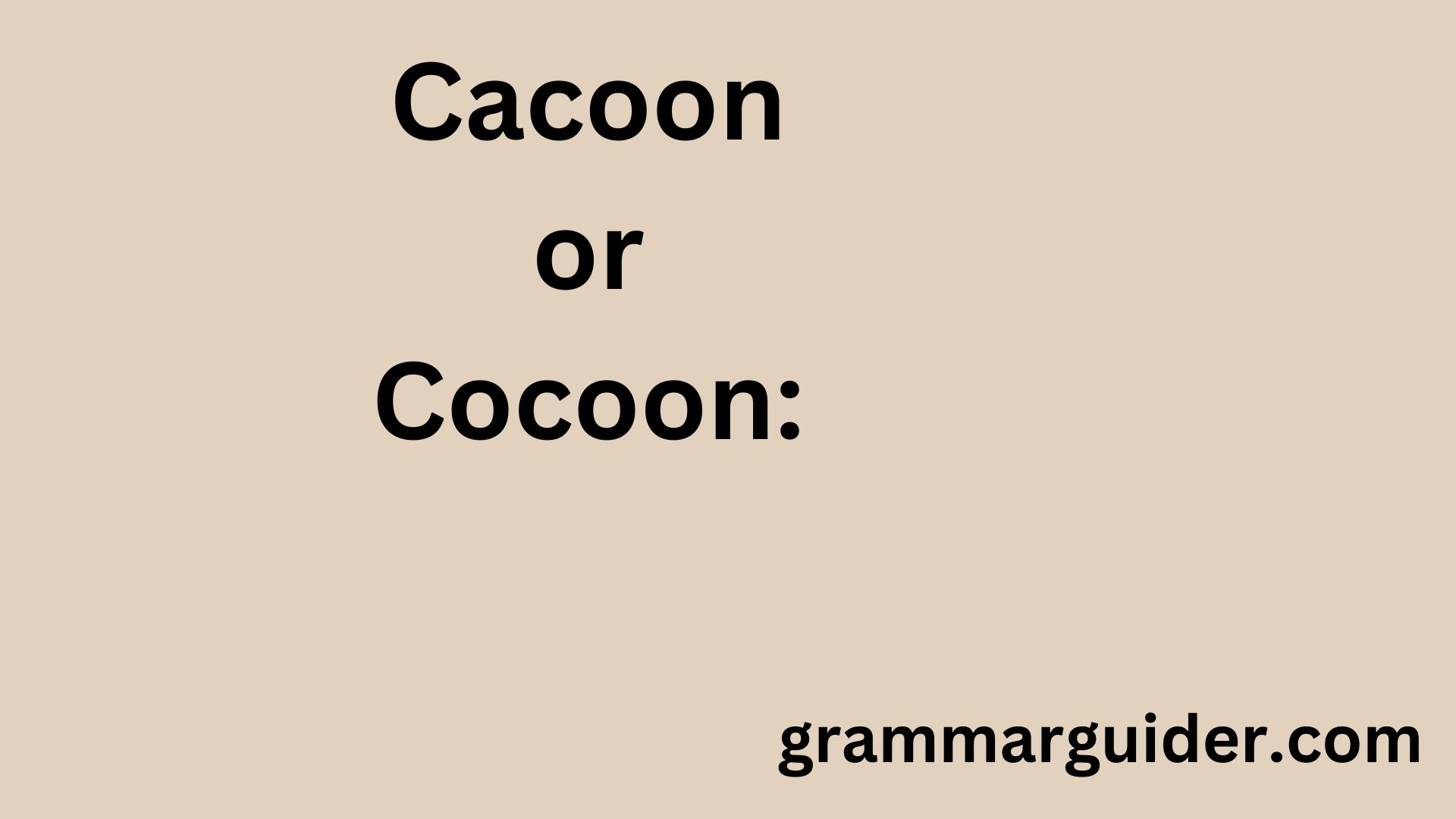The question of “cacoon or cocoon” often pops up, especially among people unfamiliar with the spelling of certain words. It’s a classic case of two similar words, one of which is correct and the other isn’t, yet they both seem to have the same ring to them.
In this article, we’ll dive into the correct spelling, explore why cocoon is the right choice, and explain the metaphorical uses of this word in various contexts such as personal growth and self-improvement.
What is a Cocoon?
Let’s first clarify what a cocoon is. In the natural world, a cocoon is a protective casing or covering spun by certain insects, particularly caterpillars, during their pupal stage. Inside the cocoon, the insect undergoes metamorphosis, transforming from a larva into an adult.
The silk covering forms a protective barrier, allowing the insect to safely transition into its next phase of life.
The word “cocoon” has also taken on deeper meanings in psychological and personal development contexts. Just as an insect uses a cocoon to protect itself during its growth process, humans sometimes metaphorically “cocoon” themselves for healing, reflection, or personal growth.
Cacoon: The Incorrect Spelling
Let’s clear up the confusion right away: “Cacoon” is an incorrect spelling of the word “cocoon”. It’s a common misspelling, but the correct form is always cocoon. Even though “cacoon” might look like a reasonable variant at first glance, it simply doesn’t exist in the dictionary. Whether you’re writing an email, a professional report, or even just texting a friend, always use cocoon to refer to that protective covering.
Example of Cacoon vs. Cocoon in Writing
Imagine you’re sending an email to a colleague, and you accidentally use “cacoon” instead of “cocoon.” Here’s how it might look:
Subject: Important Update on the Team’s Project Progress
Dear Sarah,
I hope you’re doing well. I just wanted to update you on the team’s progress with the new initiative. We’ve reached a point where we feel like we’re in a metaphorical cacoon—we’re reflecting and working through some internal challenges before pushing forward with the next steps.
Best regards,
John
The use of “cacoon” here is a typo and should be corrected to “cocoon”. The word “cocoon” in this context refers to a period of self-care or personal transformation, where John’s team is retreating temporarily to improve their work strategy.
Let’s now shift gears and explore the deeper significance of cocoon in personal development and transformation.
The Symbolism of the Cocoon in Personal Growth
In human experience, the cocoon often serves as a metaphor for personal transformation. Just like a caterpillar undergoes a remarkable change inside its protective casing, people sometimes need to go through a withdrawal period of introspection and self-reflection to experience their own transformation. This could be part of a journey toward self-improvement, healing, or achieving better mental health.
Many people intentionally engage in cocooning, which is the practice of withdrawing from the chaos of daily life in order to focus on their personal development. This could mean taking time off work, attending a cocooning retreat, or simply spending quiet time at home.
Example of a Metaphorical Cocoon in an Email
Let’s imagine someone named Laura is sending an email to a friend explaining her recent retreat for self-care. Here’s an example:
Subject: My Cocooning Retreat – A Much-Needed Break
Dear Melissa,
I wanted to tell you about the incredible retreat I just returned from. It was exactly what I needed—a true metaphorical cocoon. For a few days, I isolated myself from everything, focusing solely on my healing and personal growth. I think everyone could benefit from this kind of metaphorical cocooning from time to time.
During the retreat, I spent time in quiet reflection, meditated daily, and explored techniques for self-improvement. I feel rejuvenated and more connected to my goals now.
Hope to catch up soon!
Laura
In this case, Laura is using the word cocoon to describe her time of personal withdrawal and growth process. This period allowed her to retreat and focus on herself—just as an insect would be protected by its cocoon during its metamorphosis.
Cocooning as a Process of Personal Transformation
People may cocoon themselves during difficult times. It could be a response to trauma, a job loss, a breakup, or simply feeling overwhelmed. The psychological cocoon provides a safe space to process emotions, reflect, and find a sense of clarity before moving forward. In this safe environment, individuals can engage in meaningful self-care practices and work on their own transformation.
The cocoon metaphor has been adopted in the field of psychology to describe periods of withdrawal, healing, or recovery. In fact, a psychological cocoon could represent the mental space people create when they need to step back from external stressors in order to heal.
Cocoon vs. Butterfly: The Ultimate Transformation

The ultimate goal of the cocoon phase is to emerge transformed, just as the caterpillar evolves into a beautiful butterfly. This transformation is symbolic of the changes people undergo during times of deep personal growth or self-improvement. It’s about embracing the change that comes with growth, even if it requires facing the discomfort of withdrawal and isolation.
Example of the Cocoon and Butterfly Transformation
Imagine a scenario where a person, let’s call him Mark, is going through a career change. Here’s how this transformation could be communicated:
Subject: My Professional Transformation
Hey Anna,
I’ve been thinking a lot about the changes I’ve been going through. It feels like I’m currently in a cocoon, focusing on learning new skills and growing my knowledge base. The process is a bit uncomfortable, but I know that like a caterpillar, I’ll come out of this cocoon phase much stronger and more capable.
This career change is my metaphorical cocoon, and I’m confident that it will lead to something bigger and better in the end.
Talk soon,
Mark
Mark is using the cocoon metaphor to describe his personal development as he goes through this transition. He compares his current state of personal growth to the protective, yet temporary, phase of a caterpillar’s pupal stage.
Cocoon Symbolism in Literature and Life
The cocoon symbolism is widely used in literature and life to represent growth, protection, and change. It speaks to the universal human experience of undergoing transformation, often in private or isolated circumstances. Just as a caterpillar needs its cocoon to complete its transformation, people sometimes need their own safe space to navigate life’s challenges and emerge stronger.
Let’s look at how the cocoon symbolism can be used in different areas of life:
- Self-care retreats: Some people opt for cocooning retreats, where they disconnect from the world to focus entirely on their healing and growth.
- Therapeutic settings: In therapy, clients may undergo periods of withdrawal to explore their emotions and work on personal development.
- Spiritual growth: Many individuals use the cocoon metaphor when discussing their spiritual journey—emerging as a new, more enlightened version of themselves.
Table: Cocoon vs. Cacoon
| Term | Correct Spelling | Meaning | Example Usage |
|---|---|---|---|
| Cocoon | ✅ | Protective covering spun by caterpillars or a metaphor for personal transformation and growth | “She’s in a metaphorical cocoon, working on herself.” |
| Cacoon | ❌ | Incorrect spelling of “cocoon” | (Avoid using this in any context) |
Conclusion
So, when it comes to cacoon or cocoon, there’s only one correct spelling: cocoon. Whether you’re talking about the protective covering spun by caterpillars or using it as a metaphor for personal growth, always remember to spell it with two “o”s.
The cocoon represents protection, change, and the growth process, both in nature and in human experience. Whether you’re embracing cocooning for healing, reflection, or self-improvement, remember that this phase of isolation can lead to beautiful transformations, just like the butterfly that emerges after its time in the cocoon.
As you go about your day, be mindful of the proper spelling of cocoon and how this simple word can encapsulate powerful moments of transformation in your life.

Harley Rose is a seasoned expert in English grammar and writing tips, blending years of knowledge and a love for language into her work. With a sharp eye for detail and a talent for making grammar accessible, Harley shares practical insights that help readers write with precision and flair. Her content is ideal for anyone looking to strengthen their writing skills and express themselves with confidence.

